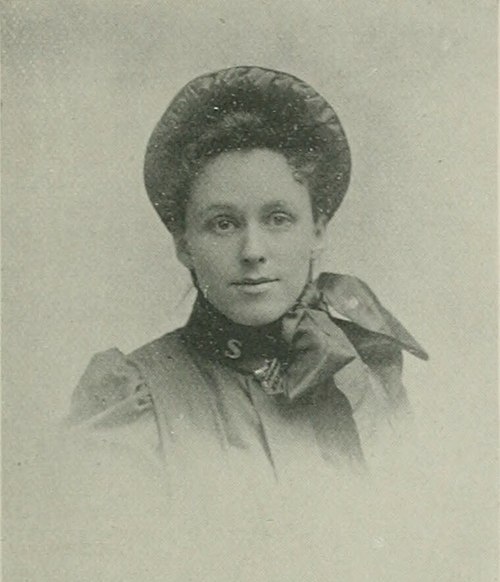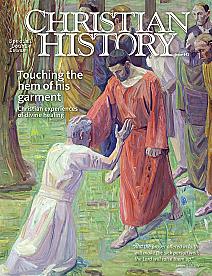Carrie Judd Montgomery’s TRIUMPHS of Faith

[Carrie Judd, from Frances E. Willard's A Woman of the Century. Buffalo, N.Y., Moulton, 1893. Public domain, Wikimedia.]
AS A TEENAGER, Carrie Judd became seriously ill following a fall that injured her spine. Touch, movement, and sound became torture to her. Judd’s condition was aggravated by a spiritual malaise. An earnest Christian of the Episcopal Church, she had worked for the Lord—developing a large Sunday school class in Buffalo, New York—and had sought to eradicate her sins. Yet she held back one treasure. She sensed the Lord also insisted she surrender to him her dream of writing. “I am going to hold it tight in my clasped hands, but if Thou MUST have it, tear my hands apart.”
For three years she pined in bed, dwindling to 85 pounds; she was expected to die at any moment. Friends came to say goodbye. Then her father read a newspaper article about Sarah Freeman Mix, an African American who prayed for the sick after her own healing from tuberculosis. The Judds contacted Mix, who immediately wrote back. She was unable to visit them, but agreed to pray at a designated time.
On this day, 26 February 1879, as the Mix family and the Judds united their prayers from two different states, Judd was able to rise from bed on her own. The touch of her nurse no longer pained her. By April she was taking walks and in July she was teaching Sunday school again.
Her story spread. Hundreds of letters came asking for details. People pleaded for her prayers and asked to be able to visit her. She responded to the many letters she received, and her family set aside a parlor for visitors. To economize her time, Judd published the story of her healing and its biblical basis. The Prayer of Faith (1880) reached thousands and was the first American book on faith healing to become well-known.
The following year, she founded Triumphs of Faith, a monthly magazine she would edit for the next 65 years. It featured accounts of healings, as well as biblical teachings on holiness, prayer, and faith. She would also write an autobiography Under His Wings as well as other books. Thus the Lord used her gift of writing.
In the early years of Judd’s ministry, her associations were often with Methodists. Her work grew. She established a home to which the sick could come for teaching about healing and prayer. Coming into contact with A. B. Simpson, she became a founding member of the Christian Alliance he established (later the Christian and Missionary Alliance) and served as its secretary. It was Simpson who first featured her as a speaker.
In 1890, after George Montgomery and Carrie Judd married, they moved to Oakland, California. There they built a three-story healing home (which also served as a rest home for missionaries). They were founding members of the area’s Salvation Army, with which they worked closely.
The pair established camp meetings, an orphanage, various schools (including Shalom Training Center for missionaries), and mission work among Mexican miners.
In a doctoral dissertation, Daniel Albrecht summed up Montgomery’s life of service in these words:
When Carrie saw a human need she seized it as an opportunity for service. Whether the need was a hopeless street alcoholic, a young girl entrapped in prostitution, an orphaned child, a person physically sick, one weak in faith, a young person in need of training or someone who had never heard the Christian message, Mrs. Montgomery did everything within her power and imagination to minister to the need. When children were in need of a home, she established an orphanage. When there was an apparent need for missionary training on the West Coast, she founded Shalom School. When she perceived a need for information and instruction concerning divine healing, she initiated the Triumphs of Faith. Concerned with the need for creating an atmosphere in which to pray the prayer of faith, she built the Home of Peace.
Carrie Judd Montgomery printed stories about the Azusa Street revival in her magazine. In 1908 she herself spoke in tongues but she did not emphasize the gift as strongly as many Pentecostals. In 1914 she became a charter member of the Assemblies of God. Her new interests did not displace old. She remained a close ally of the Salvation Army and of the Christian Alliance.
After a world tour in which she visited missionaries in many lands, Carrie Judd Montgomery focused Triumphs of Faith more on world missions.
Carrie Judd Montgomery died in 1946, having had a significant impact on the divine healing, holiness, and Pentecostal movements. Her path had not been without opposition. For instance, she was ostracized in the South for mingling Blacks and Whites in her meetings. Although criticized for teaching and preaching to men (Paul had given two theological reasons he did not allow women to teach men—that Adam was first created and that Eve was the first to sin), she did not allow criticism to prevent her proclaiming God’s word and serving people. God gave her a fruit of many souls. Her daughter Faith and son-in-law Lowell Berry carried on her work.
—Dan Graves
------------
For more about healing, see CH 142 Divine Healing
Other Events on this Day
- Frank Laubach Developed a System that Taught Millions to Read
- JOHN’S GOLDEN MOUTH MADE HIM FAMOUS AND CAUSED HIS EXILE






